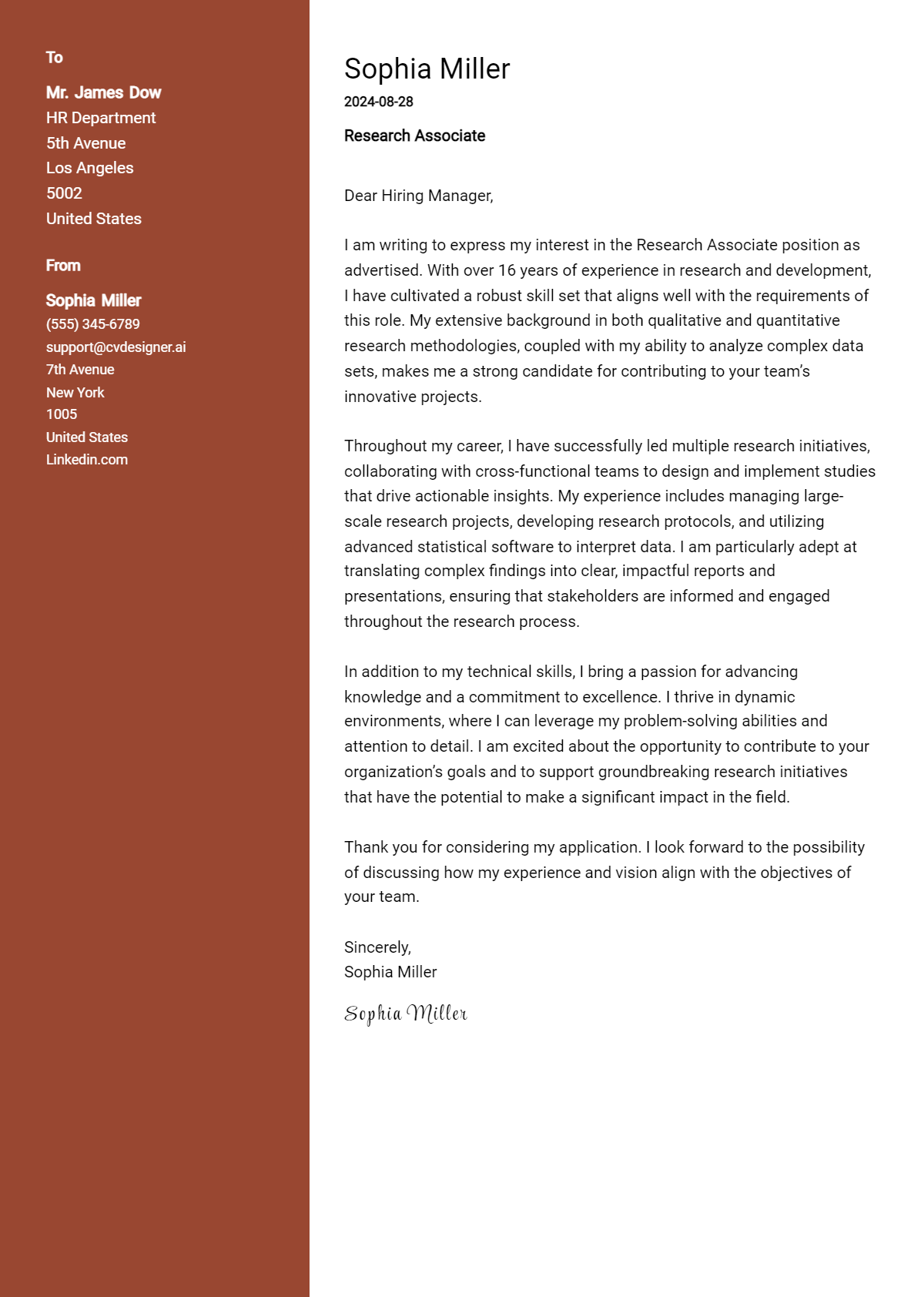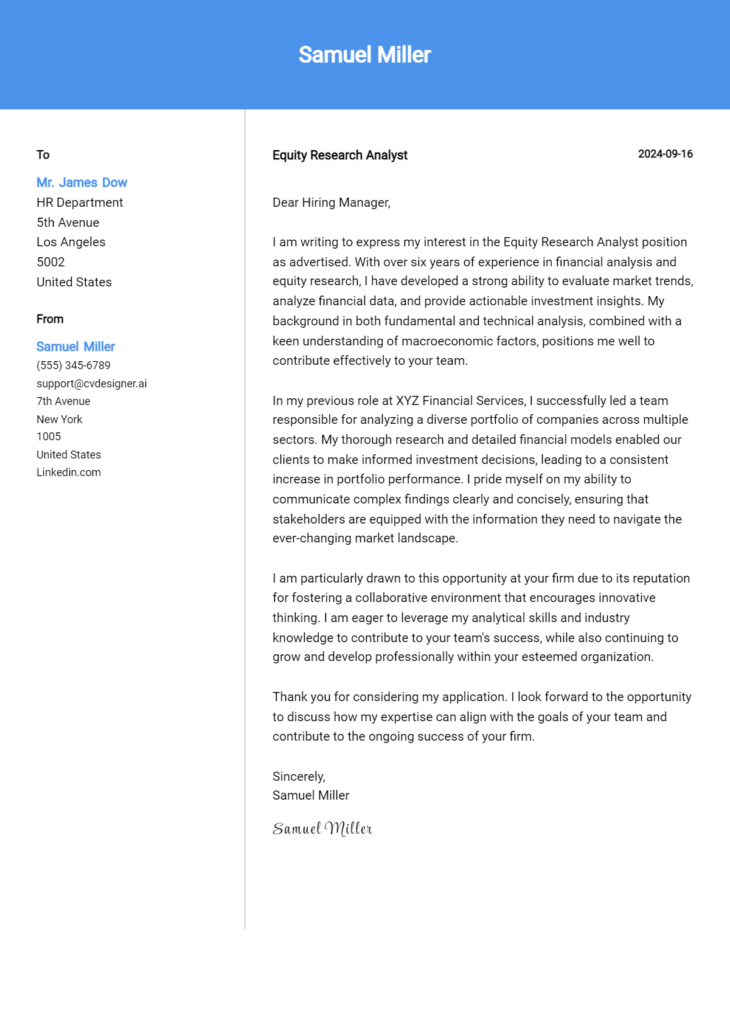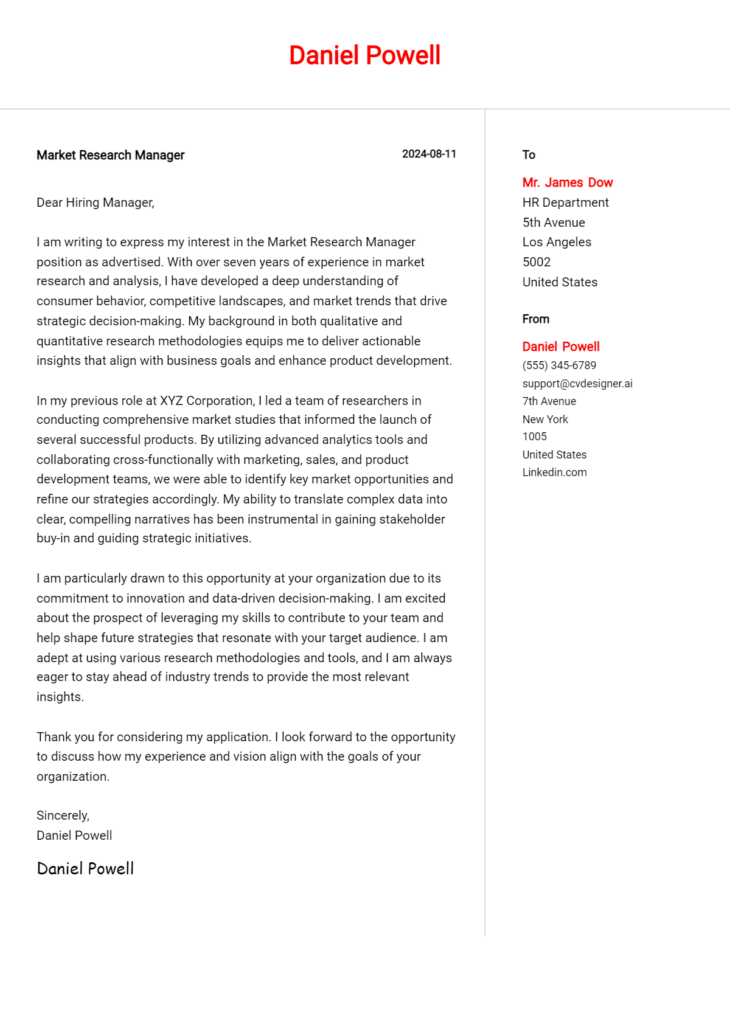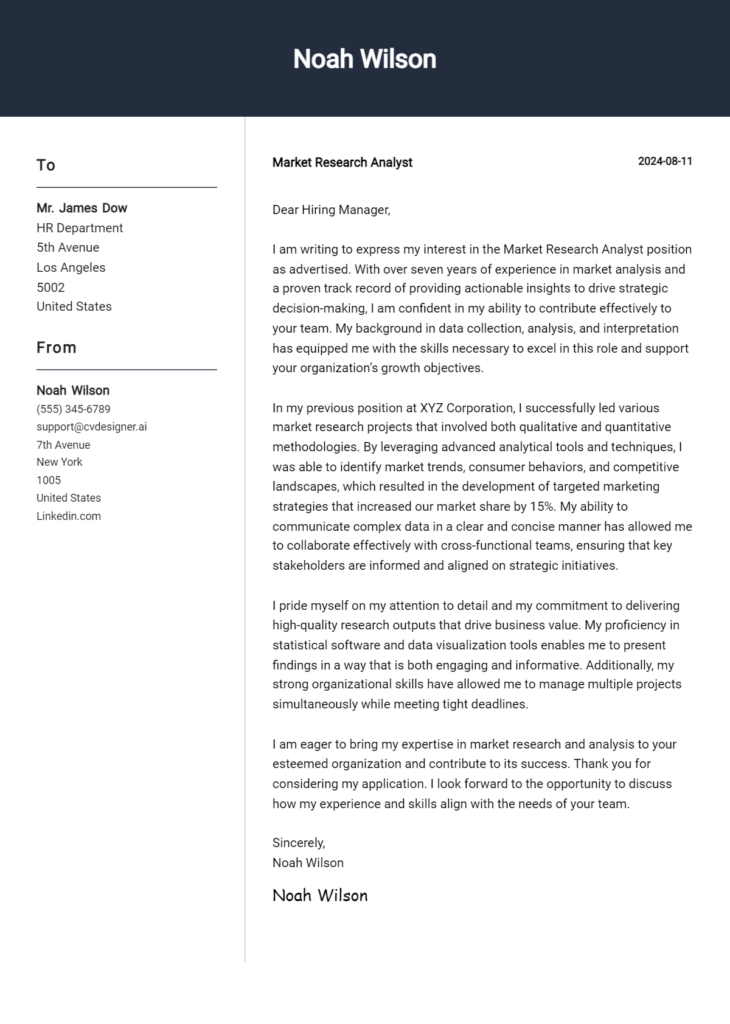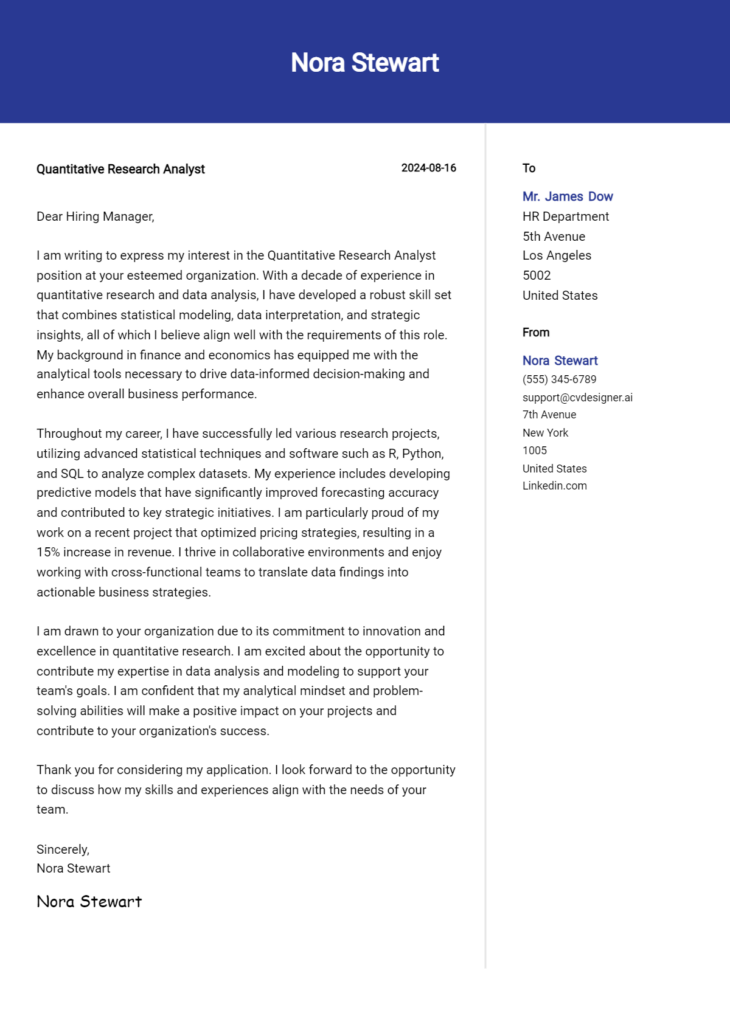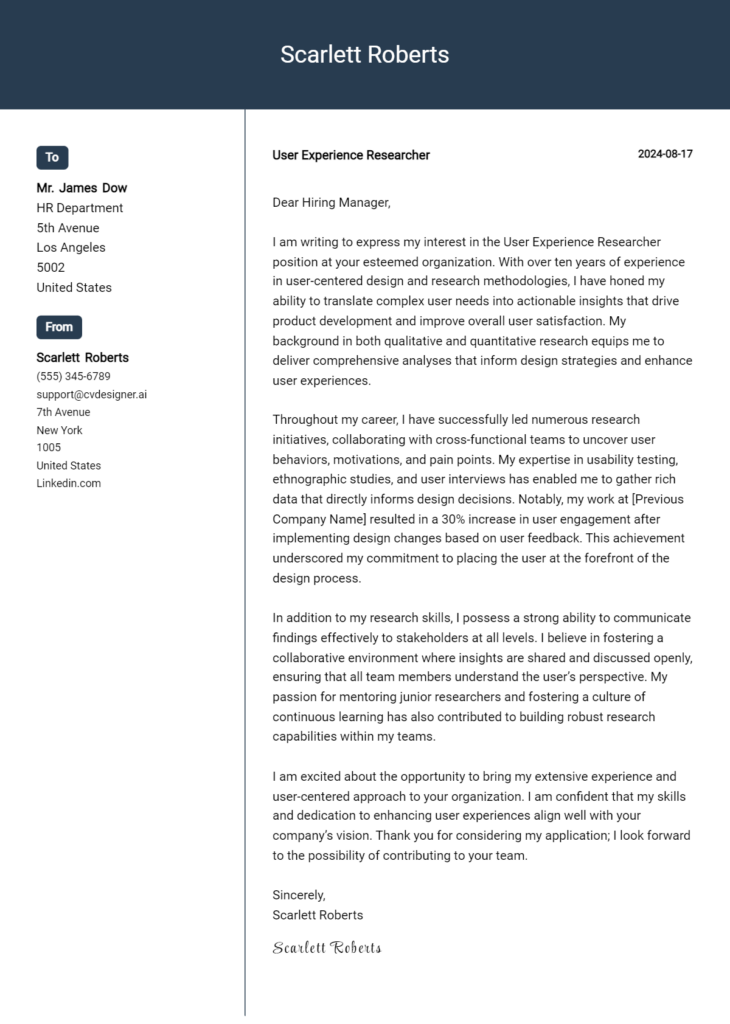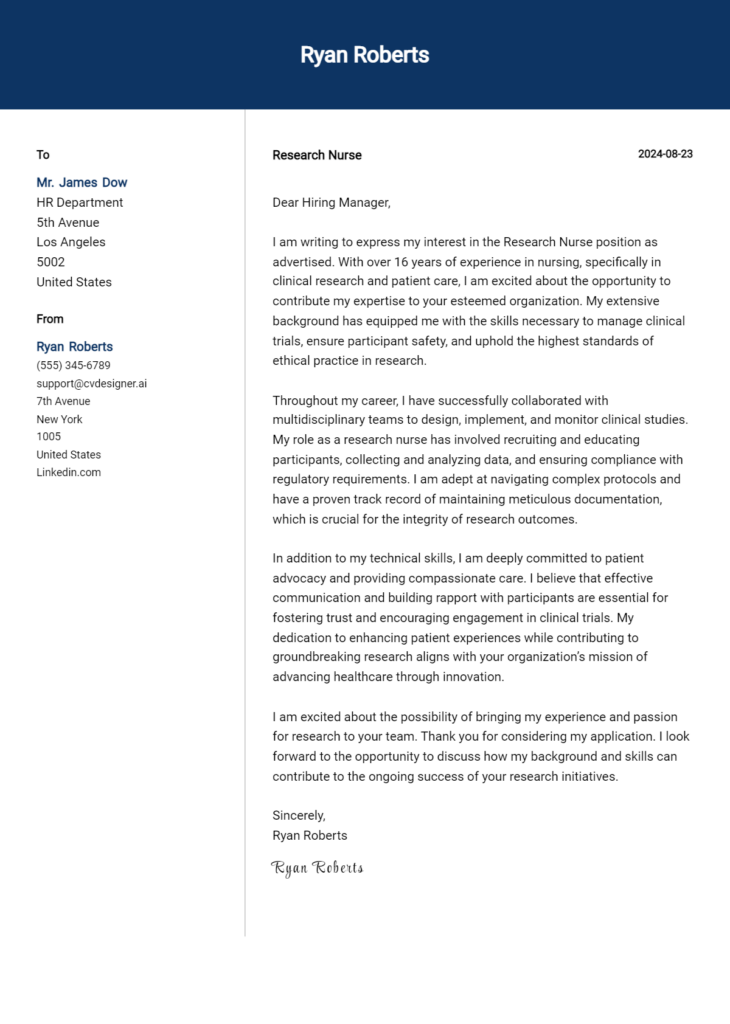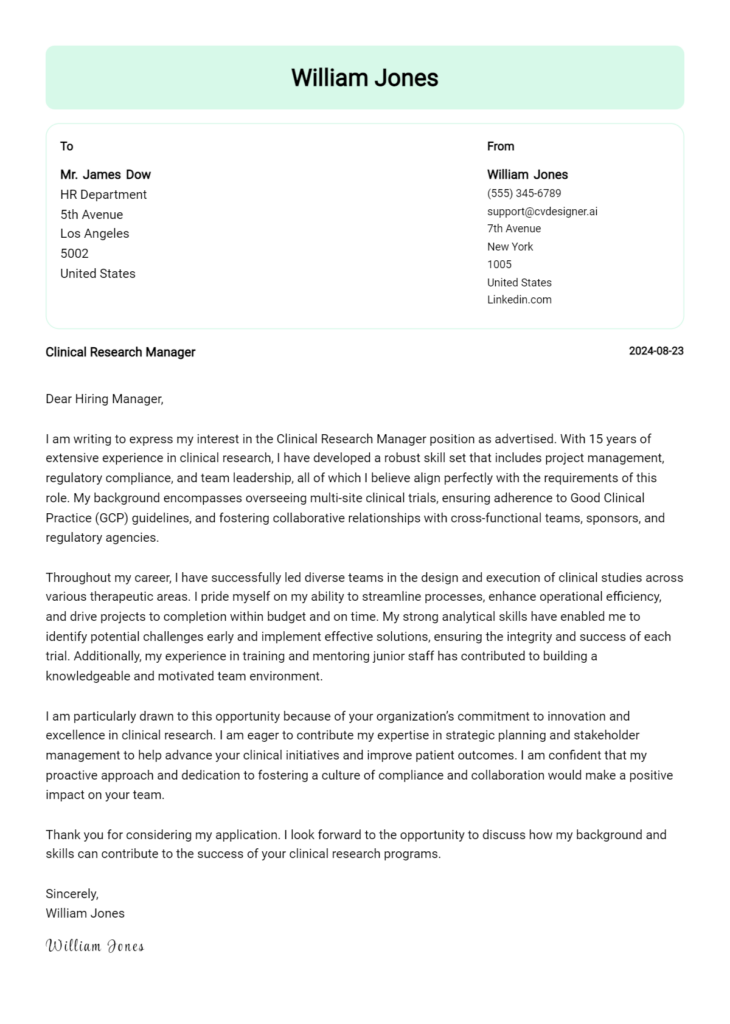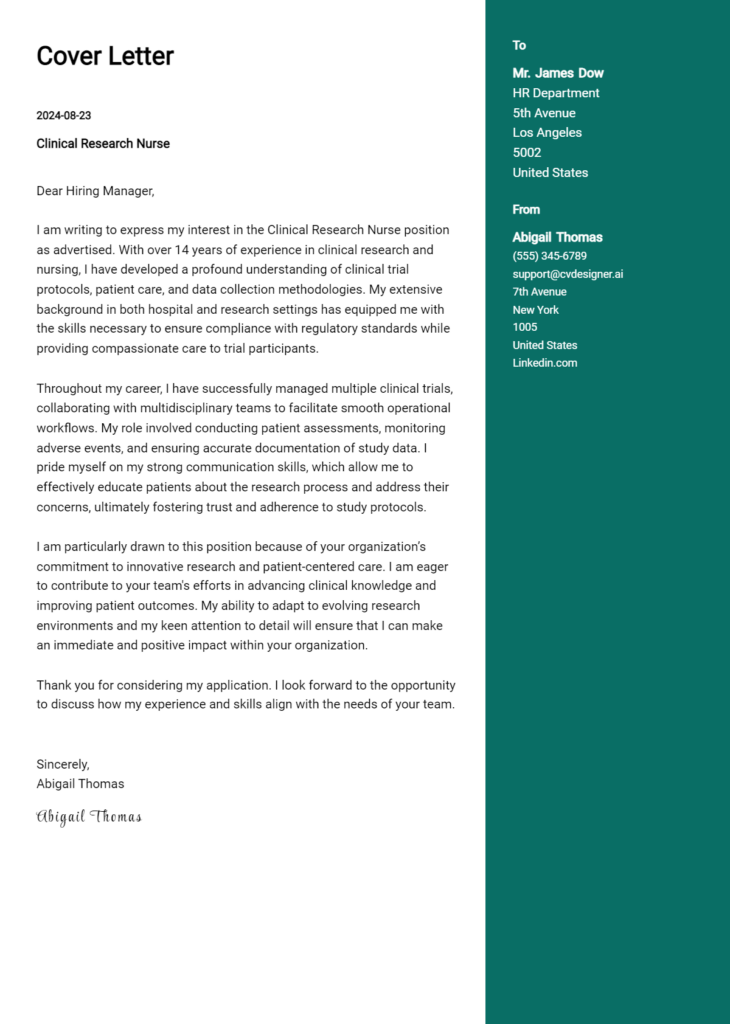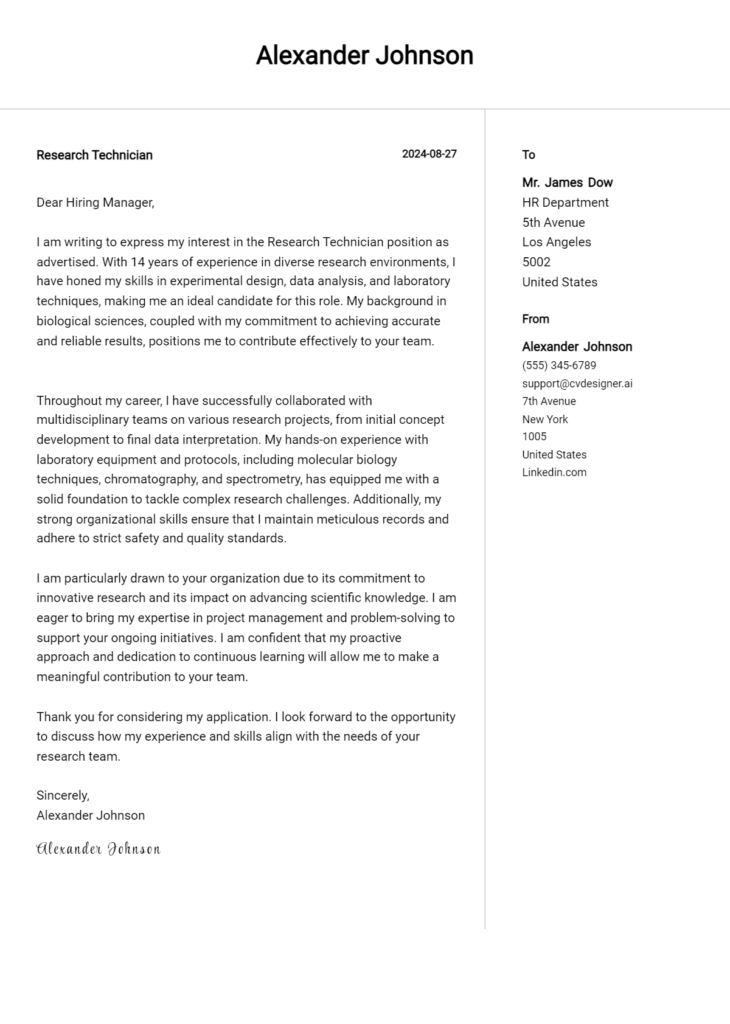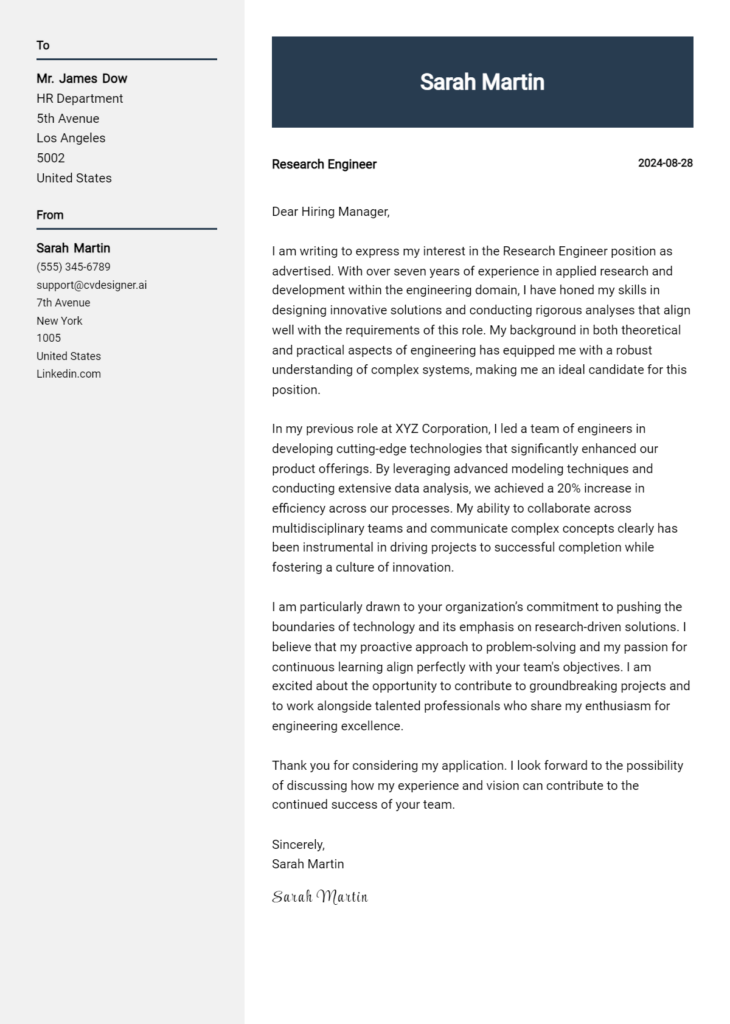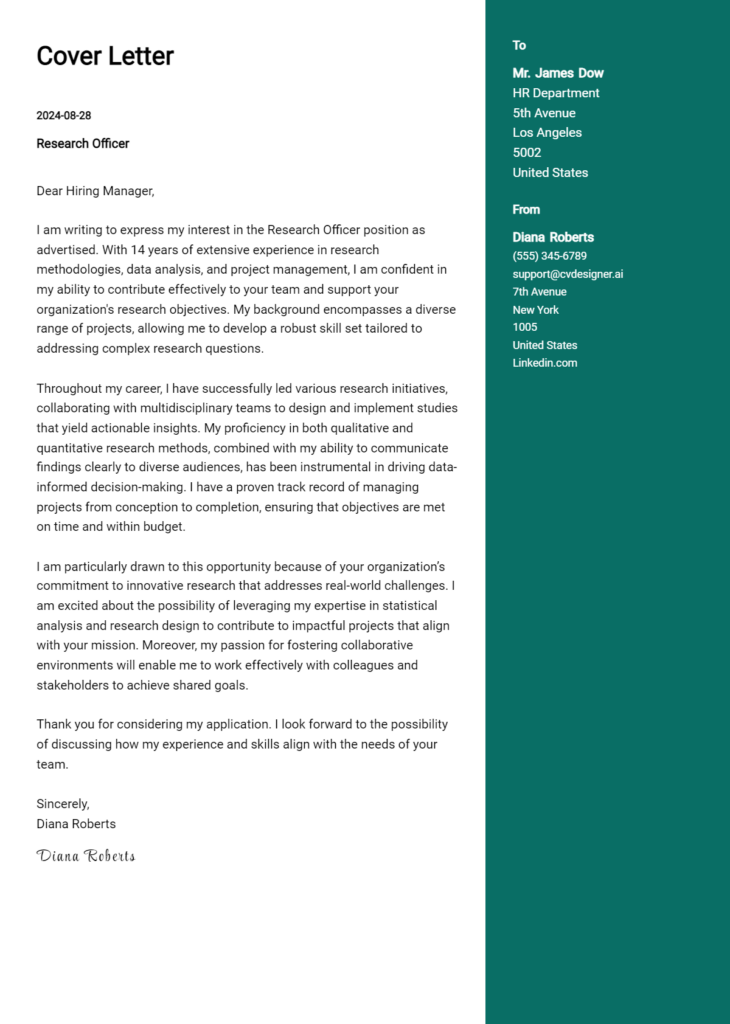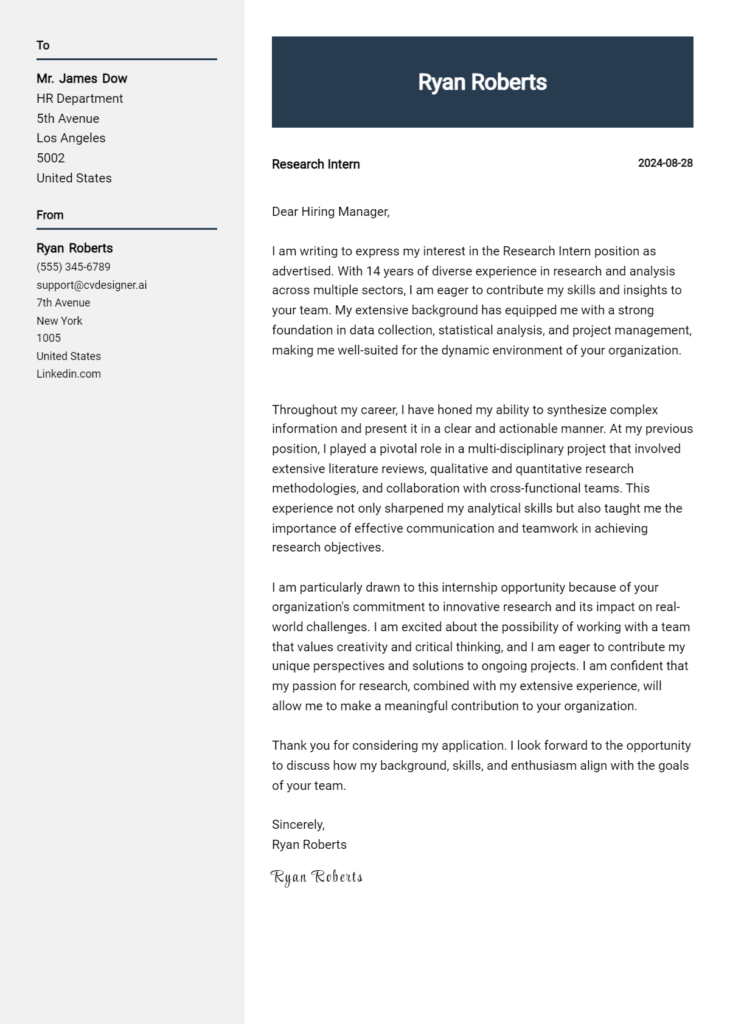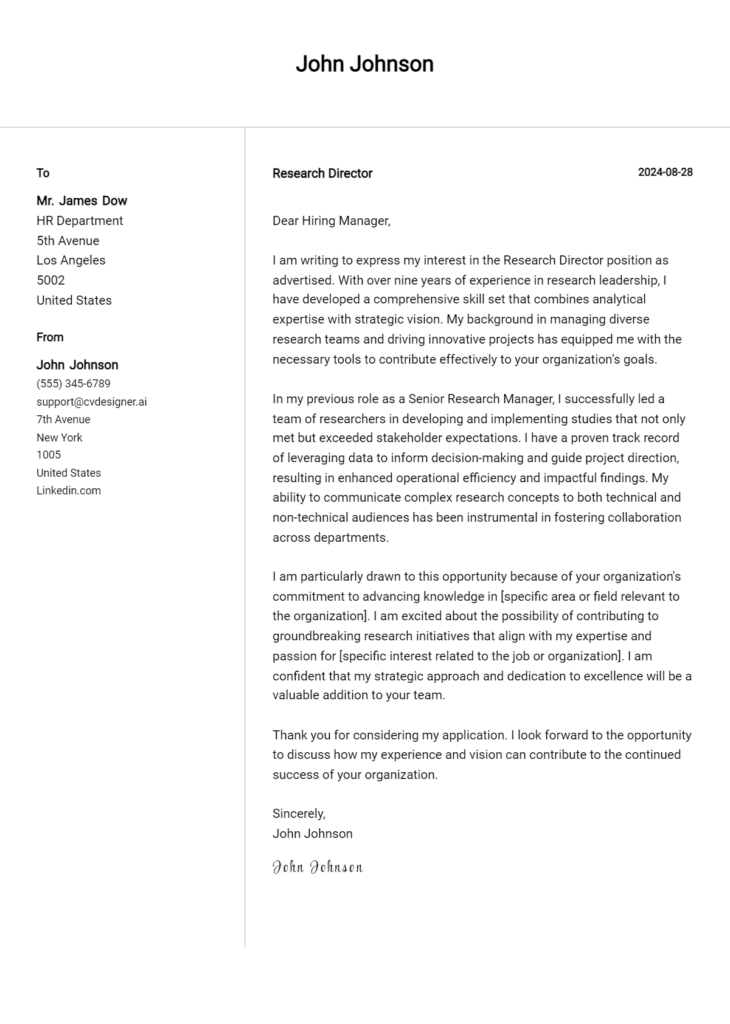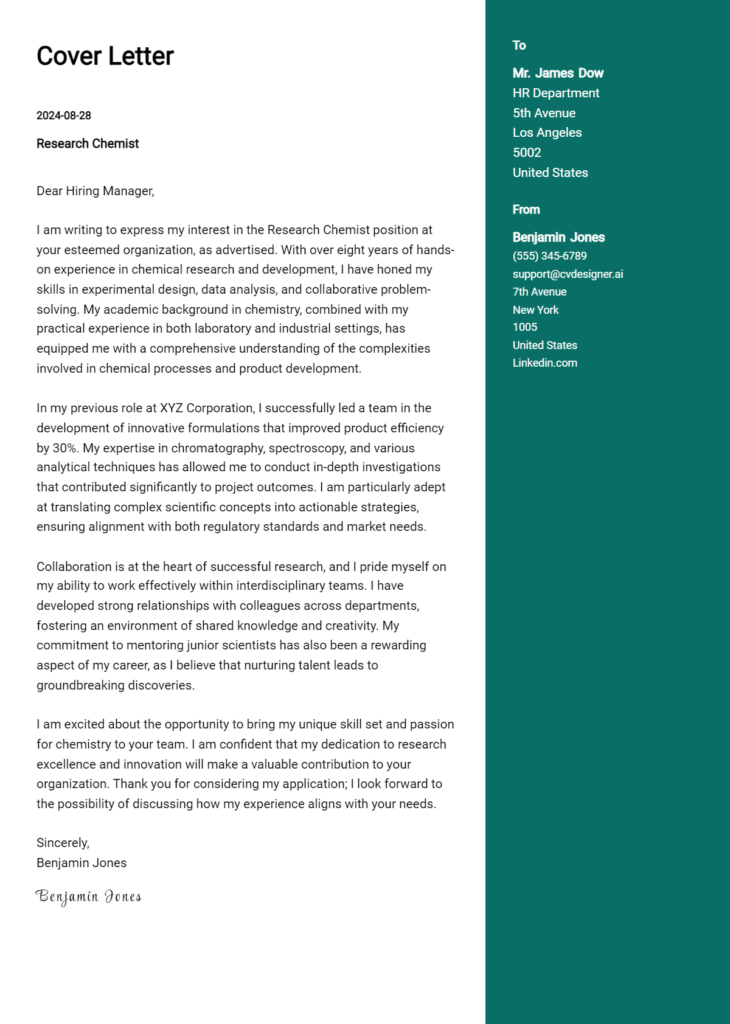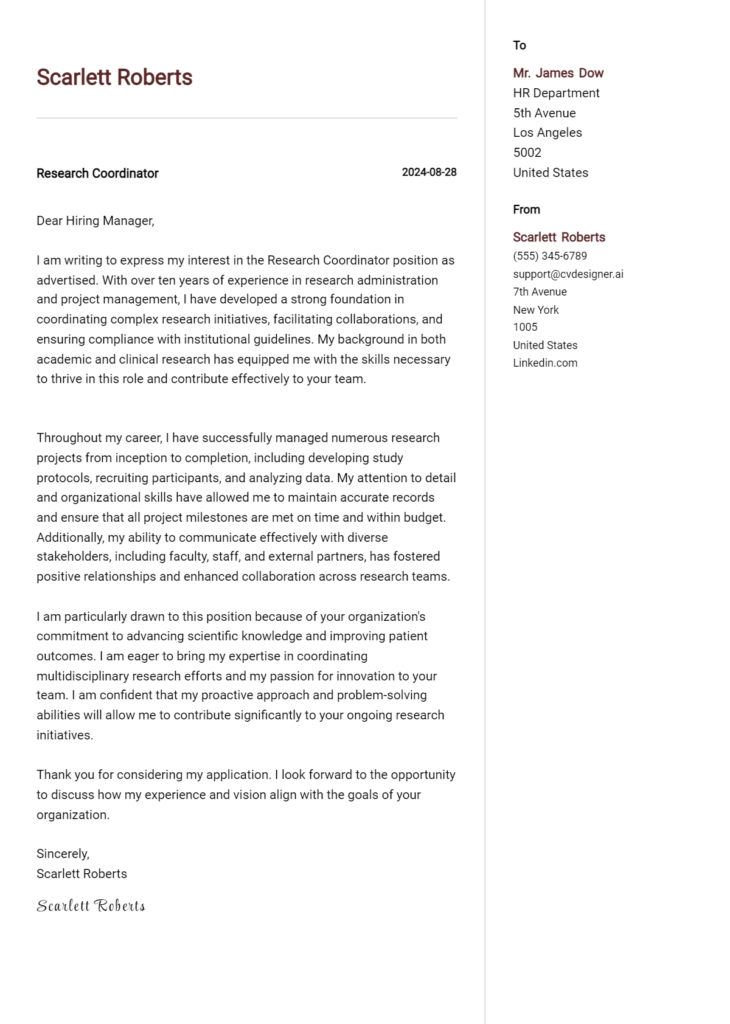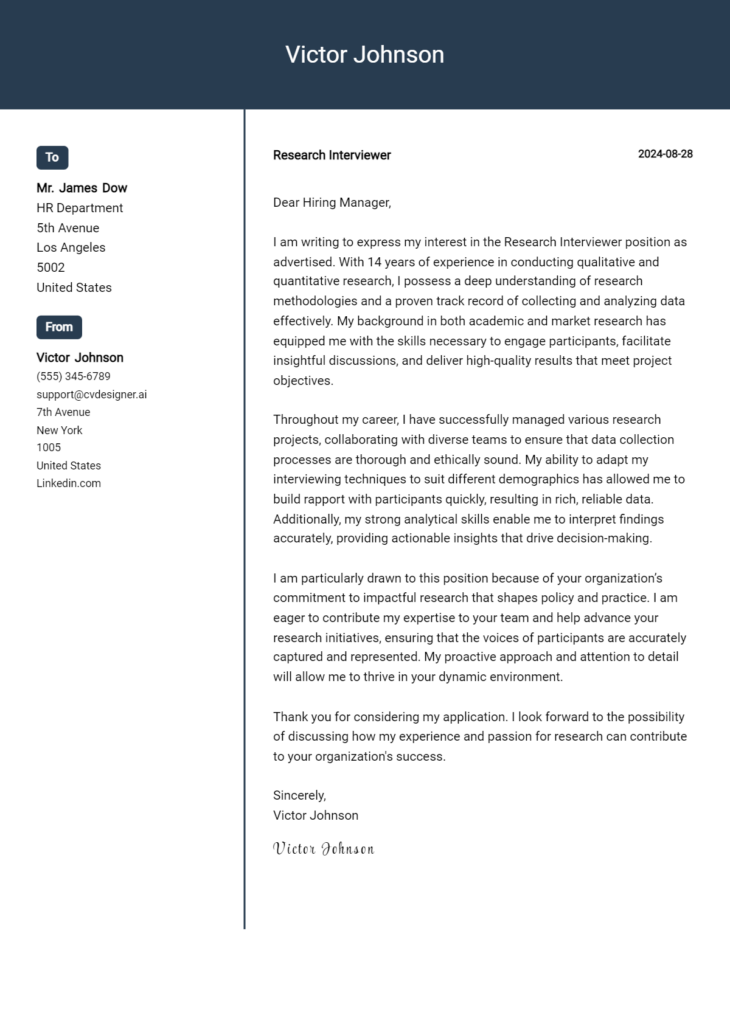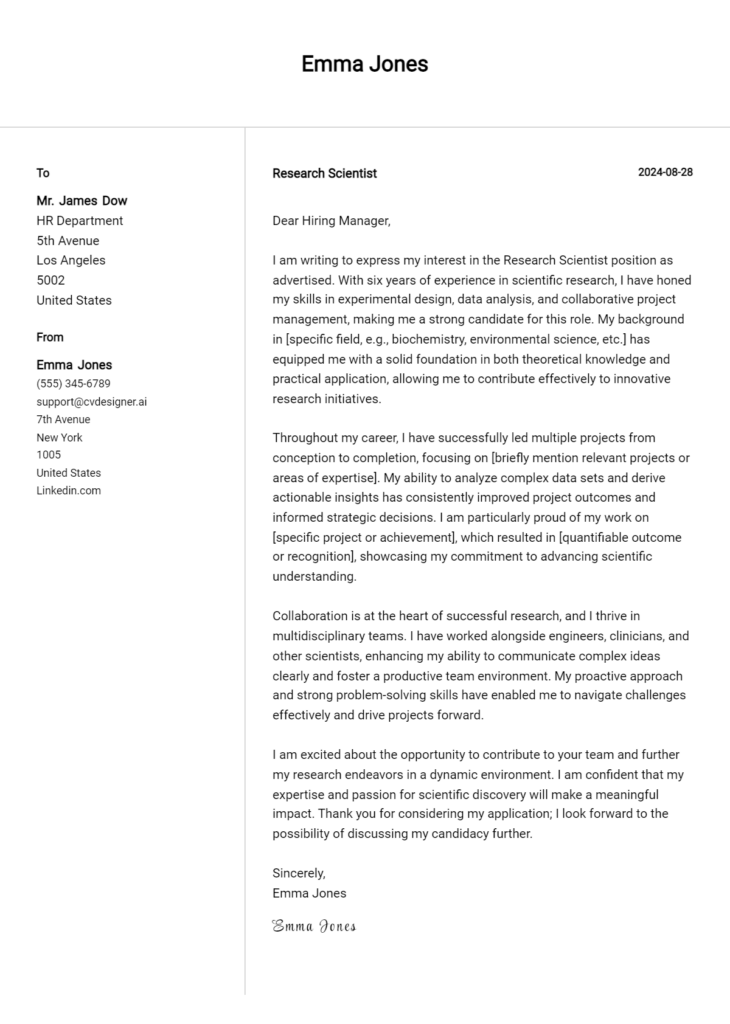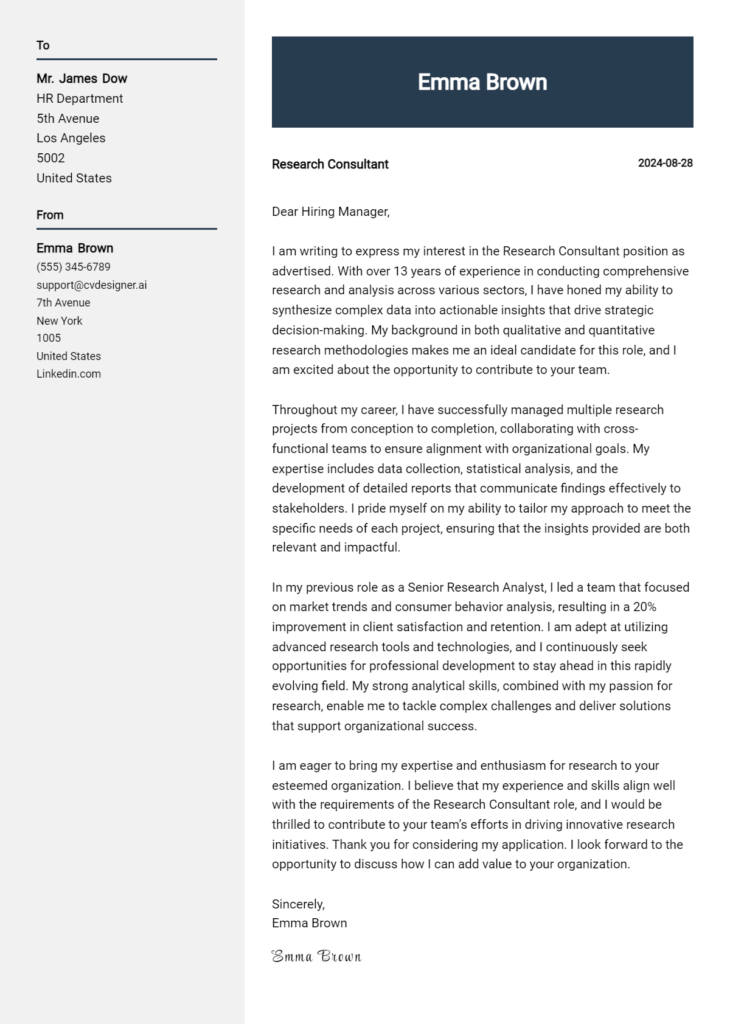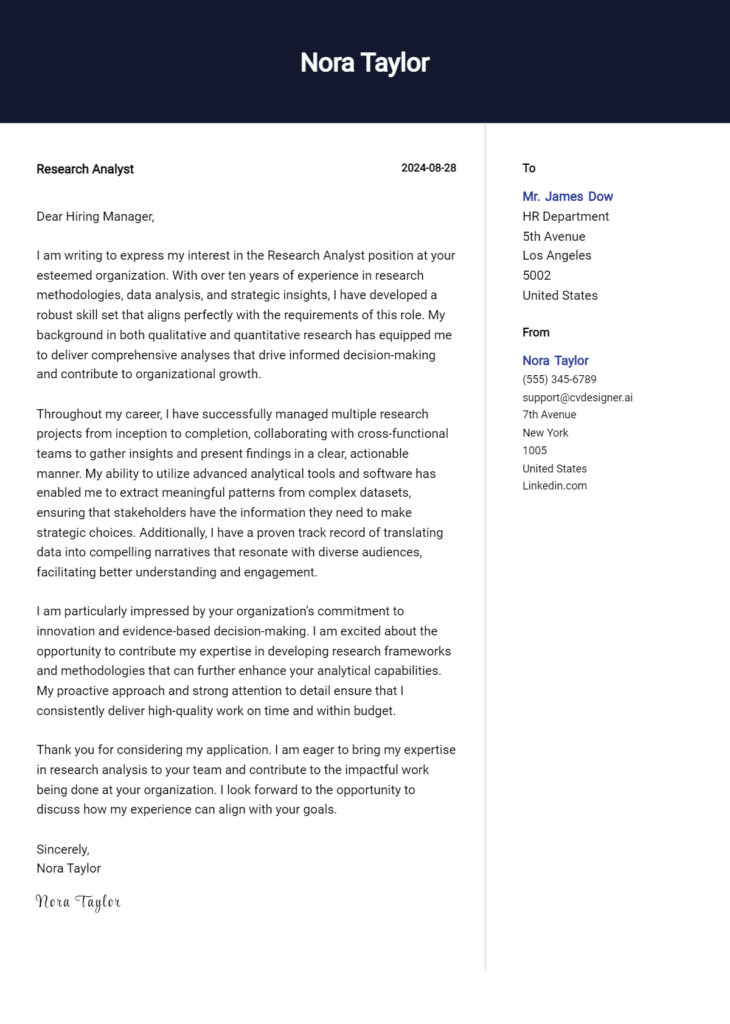Most Popular Research Associate Cover Letter Examples
Explore additional Research Associate cover letter samples and guides and see what works for your level of experience or role.
Are you ready to take the next step in your research career as a Research Associate? Crafting an effective cover letter can be the key to unlocking opportunities in this competitive field. In this comprehensive guide, we will walk you through the essential elements of a standout Research Associate cover letter that not only showcases your qualifications but also piques the interest of hiring managers. By the end of this article, you will have a clear understanding of:
- What a Research Associate Cover Letter Accomplishes: Understand the purpose and impact of a well-written cover letter in your job application process.
- Key Components of a Research Associate Cover Letter: Learn the critical elements that should be included to make your cover letter compelling and relevant.
- Format a Research Associate Cover Letter: Discover the best practices for formatting your cover letter for maximum readability and professionalism.
- Three Different Level Cover Letter Examples: Explore tailored examples for entry-level, mid-career, and senior-level Research Associate positions to inspire your own writing.
- Common Mistakes to Avoid in a Research Associate Cover Letter: Identify pitfalls that could undermine your application and how to steer clear of them.
- Key Takeaways: Summarize the main points to remember as you embark on writing your own cover letter.
Dive into this guide and equip yourself with the tools you need to create an impressive cover letter that will help you stand out in the research field!
What does a Research Associate Cover Letter accomplish?
A cover letter for a Research Associate position serves as a critical tool in showcasing an applicant's relevant skills, experiences, and motivations to potential employers. It allows candidates to highlight their research expertise, analytical abilities, and passion for scientific inquiry in a personalized manner. A well-crafted cover letter not only complements a resume but also provides insight into the applicant's personality and fit within the research team. By articulating specific achievements and aligning them with the job requirements, candidates can effectively differentiate themselves from others. For guidance on crafting an exceptional cover letter, refer to our cover letter guide, and utilize our cover letter builder to streamline the process.
Key Components of a Research Associate Cover Letter
- Introduction and Purpose: Start with a brief introduction that states the position you are applying for and where you found the job listing. This sets the context for the reader and shows your enthusiasm for the role.
- Relevant Experience and Skills: Highlight your academic background, research experience, and any specific skills that align with the job requirements. Be sure to mention any relevant methodologies, techniques, or tools you are proficient in, showcasing your fit for the role.
- Contributions and Impact: Discuss how your previous research work has led to significant findings or contributed to a project’s success. Use specific examples to demonstrate your ability to add value to the research team.
- Conclusion and Call to Action: End with a strong closing statement that reiterates your interest in the position and invites the reader to contact you for further discussion. You can also express your eagerness to contribute to their projects and mention your availability for an interview.
For more guidance, check out these cover letter examples and learn about the proper cover letter format.
How to Format a Research Associate Cover Letter
When applying for a position as a Research Associate, a well-structured cover letter is crucial to showcase your qualifications and enthusiasm for the role. Your cover letter should reflect your research skills, relevant experiences, and how you align with the organization's goals. Here are key points to consider when formatting your cover letter:
- Personalize Your Greeting: Address the hiring manager by name if possible to create a more personal connection.
- Introduce Yourself: Start with a brief introduction that includes your current position and how you learned about the opportunity.
- Highlight Relevant Experience: Mention specific research projects or roles that relate directly to the job description, emphasizing your contributions and outcomes.
- Showcase Technical Skills: Include any relevant technical skills or methodologies you are proficient in, such as statistical software, laboratory techniques, or data analysis tools.
- Demonstrate Problem-Solving Abilities: Provide examples of how you have successfully tackled challenges in previous research roles.
- Emphasize Collaboration: Discuss your experience working within multidisciplinary teams and your ability to communicate effectively with diverse stakeholders.
- Mention Relevant Education: Briefly outline your academic background and any relevant coursework or certifications that enhance your candidacy.
- Express Passion for Research: Convey your enthusiasm for the specific field of research and the mission of the organization you are applying to.
- Align with Organizational Goals: Demonstrate how your research interests align with the goals and projects of the organization, showcasing your motivation to contribute.
- Conclude with a Call to Action: End your cover letter by expressing your eagerness to discuss your application further in an interview, thanking the reader for their time and consideration.
Research Associate Entry-Level Cover Letter Example #1
Dear [Hiring Manager's Name],
I am writing to express my interest in the Research Associate position at [Company/Organization Name] as advertised on [where you found the job listing]. With a Bachelor’s degree in [Your Major] from [Your University] and hands-on experience in [specific relevant experience, e.g., laboratory research, data analysis, etc.], I am excited about the opportunity to contribute to your team and support innovative research initiatives.
During my academic career, I had the privilege of working on a research project focused on [briefly describe the research project or topic]. This experience not only honed my analytical skills but also allowed me to become proficient in various research methodologies, including [specific techniques or tools relevant to the job]. I collaborated closely with a team of peers and faculty, which enhanced my ability to communicate complex ideas clearly and effectively, both in writing and verbally.
Additionally, I completed an internship at [Company/Organization], where I assisted in the collection and analysis of data for [describe the project or study]. This role taught me the importance of meticulous attention to detail, as well as the ability to manage multiple tasks simultaneously under tight deadlines. I also gained experience in using statistical software such as [mention any relevant software, e.g., R, SPSS, etc.], which I believe would be beneficial in the Research Associate role.
I am particularly drawn to [Company/Organization Name] because of your commitment to [specific aspect of the company’s mission or projects that interests you]. I am eager to bring my background in [mention relevant skills or experiences] and my passion for research to your esteemed team. I am confident that my enthusiasm for learning and dedication to contributing to impactful research will make me a valuable asset to your organization.
Thank you for considering my application. I look forward to the opportunity to discuss how my background, skills, and interests align with the goals of [Company/Organization Name]. I am excited about the possibility of contributing to your research efforts and am eager to further explore this opportunity.
Sincerely,
[Your Name]
[Your Contact Information]
[Your LinkedIn Profile or Website, if applicable]
Research Associate Mid-Level Cover Letter Example #2
I am writing to express my interest in the Research Associate position at [Company/Organization Name], as advertised on [where you found the job listing]. With a Master’s degree in [Your Field] and over three years of hands-on experience in research methodologies, data analysis, and project management, I am excited about the opportunity to contribute to your team and support the innovative research initiatives at [Company/Organization Name].
In my previous role at [Previous Company/Organization Name], I successfully managed multiple research projects from inception to completion, collaborating with cross-functional teams to ensure alignment with project goals. My experience includes designing experiments, conducting quantitative and qualitative analyses, and presenting findings to stakeholders. For instance, I led a project that examined [specific project or study], which resulted in [specific outcome or impact]. This experience honed my skills in utilizing statistical software such as SPSS and R, enabling me to derive insights that informed strategic decisions.
I am particularly drawn to the mission of [Company/Organization Name] in [specific area of research or focus], and I am eager to leverage my background in [specific relevant experience or skill] to support your ongoing projects. My experience in [another relevant experience or skill] has equipped me with a comprehensive understanding of [relevant topic or field], and I am confident in my ability to contribute effectively to your research objectives. Additionally, my strong communication skills have allowed me to disseminate complex information clearly and effectively to diverse audiences, fostering collaboration and understanding across teams.
As a proactive and dedicated researcher, I thrive in fast-paced environments and am committed to maintaining the highest standards of quality and integrity in my work. I am excited about the possibility of joining [Company/Organization Name] and contributing to impactful research that drives meaningful change. Thank you for considering my application. I look forward to the opportunity to discuss how my skills and experiences align with the needs of your team.
Research Associate Experienced Cover Letter Example #3
I am writing to express my interest in the Research Associate position at [Company/Institution Name], as advertised on [where you found the job listing]. With over [number] years of extensive experience in [specific field or area of research], I am excited about the opportunity to contribute to your team and further advance innovative research initiatives.
In my previous role at [Previous Employer Name], I successfully led a team in a groundbreaking project focused on [specific project or research area]. My responsibilities included designing and implementing experimental protocols, analyzing complex data sets, and presenting our findings at national conferences. This experience honed my skills in both quantitative and qualitative research methodologies, allowing me to contribute significantly to our published papers in reputable journals. My commitment to maintaining high research standards and my attention to detail ensured the accuracy and reliability of our results.
Additionally, I have extensive experience in [specific techniques, tools, or methodologies relevant to the position], which I utilized to enhance our research outcomes. For instance, I implemented [specific technique or software] to streamline data collection processes, resulting in a [specific percentage] increase in efficiency. My strong analytical skills, combined with my proficiency in [any relevant programming languages or software], enable me to dissect complex problems and provide actionable insights that drive research forward.
Collaboration is vital in any research environment, and I pride myself on my ability to work effectively within multidisciplinary teams. At [Previous Employer Name], I was an integral part of a cross-functional team that bridged the gap between [specific departments or fields]. This experience not only enhanced my communication skills but also fostered a deeper understanding of how collaborative efforts can lead to innovative solutions in research.
I am particularly drawn to the Research Associate position at [Company/Institution Name] due to [specific reason related to the company or its projects]. I am eager to bring my expertise in [specific area] and my passion for [specific aspect of research] to your team. I am confident that my background and skills will allow me to make a meaningful contribution to your ongoing projects and help drive future research endeavors.
Thank you for considering my application. I look forward to the opportunity to discuss how my experience and vision align with the goals of [Company/Institution Name]. I am enthusiastic about the possibility of contributing to your esteemed team and am available for an interview at your earliest convenience.
Cover Letter Tips for Research Associate
When crafting a cover letter for a Research Associate position, it's essential to convey both your passion for research and your relevant skills and experiences clearly. Start with a strong opening that captures the hiring manager's attention, and make sure to tailor your letter to the specific research area or project of the institution. Highlight your academic background, technical skills, and any research experience that aligns with the job description. Use concrete examples to demonstrate your ability to contribute to the team and discuss your enthusiasm for the organization's work. Finally, make sure to proofread your letter for clarity and professionalism.
Cover Letter Tips for Research Associate:
- Tailor Your Letter: Customize your cover letter for each position by mentioning specific projects or research areas of the institution that resonate with your interests and expertise.
- Highlight Relevant Experience: Clearly outline your previous research experience, including internships, projects, or publications that are pertinent to the job.
- Showcase Technical Skills: Include specific technical skills relevant to the position, such as proficiency in laboratory techniques, data analysis software, or statistical methods.
- Demonstrate Soft Skills: Research Associates often work in teams; highlight your collaboration, communication, and problem-solving skills.
- Include Academic Achievements: Mention your academic qualifications, relevant coursework, and any honors or awards that demonstrate your commitment and competence in research.
- Express Enthusiasm: Convey genuine excitement about the opportunity and the impact your research might have within the organization.
- Keep It Concise: Aim for a one-page cover letter that is succinct and focused, ensuring every sentence adds value to your application.
- Proofread: Carefully check for grammatical errors, typos, and clarity to present a polished and professional image.
How to Start a Research Associate Cover Letter
When crafting a cover letter for a Research Associate position, it's crucial to begin with a strong introduction that captures the attention of the hiring manager. Here are some effective examples:
As a dedicated researcher with a Master’s degree in Molecular Biology and hands-on experience in laboratory settings, I am excited to apply for the Research Associate position at [Company Name]. My passion for scientific inquiry and my commitment to advancing knowledge in the field make me a perfect fit for your team.
I am writing to express my interest in the Research Associate position at [Company Name]. With over three years of experience in data analysis and experimental design, I have developed a robust skill set that aligns well with the qualifications you seek, and I am eager to contribute to your innovative research efforts.
With a strong background in statistical analysis and a keen interest in applied research, I am thrilled to apply for the Research Associate role at [Company Name]. My previous experience at [Previous Company] has equipped me with the skills necessary to support your research initiatives effectively.
I am excited to submit my application for the Research Associate position at [Company Name]. Having recently completed my PhD in Environmental Science, I possess the analytical skills and research experience necessary to make a meaningful contribution to your ongoing projects.
As a highly motivated researcher with a proven track record in laboratory management and project coordination, I am eager to join [Company Name] as a Research Associate. My experience in collaborative research settings has honed my ability to contribute effectively to multidisciplinary teams.
How to Close a Research Associate Cover Letter
As you conclude your cover letter for a Research Associate position, it's vital to leave a strong impression and express your enthusiasm. Here are some effective examples of how to close your letter:
I am eager to bring my analytical skills and passion for research to your esteemed team, and I look forward to the opportunity to discuss how I can contribute to your ongoing projects.
Thank you for considering my application. I am excited about the possibility of collaborating with your talented team and am hopeful to discuss my qualifications in more detail during an interview.
I appreciate your time and consideration, and I am enthusiastic about the potential to impact your research initiatives positively. I look forward to the opportunity to speak with you soon.
Thank you for the opportunity to apply for the Research Associate position. I am looking forward to the possibility of contributing to your research efforts and am excited about the future of your projects.
Common Mistakes to Avoid in a Research Associate Cover Letter
When applying for a Research Associate position, your cover letter serves as a critical introduction to your skills and qualifications. A well-crafted cover letter can set you apart from other candidates, but common pitfalls can undermine your chances of making a positive impression. To enhance your application, it’s essential to avoid the following mistakes:
- Generic Content: Failing to tailor your cover letter to the specific role and institution can make it seem impersonal.
- Neglecting the Job Description: Ignoring key qualifications and responsibilities listed in the job description can lead to a misalignment between your skills and the employer's needs.
- Excessive Length: Writing an overly long cover letter can deter hiring managers; aim for one page.
- Overly Technical Language: Using jargon specific to your field without explaining it can alienate non-specialist readers.
- Lack of Specific Examples: Failing to include concrete examples of your achievements can weaken your narrative and make it less compelling.
- Typos and Grammatical Errors: Submitting a letter with errors reflects poorly on your attention to detail, which is crucial in research roles.
- Ignoring Formatting: Poor formatting can make your cover letter hard to read; maintain a professional layout and font.
- Weak Opening Statement: Starting with a bland or generic opening can fail to engage the reader; instead, begin with a strong hook.
- Focusing on What You Want: Centering the letter on your desires rather than how you can contribute to the organization can come across as self-serving.
- Neglecting to Express Enthusiasm: A lack of passion for the research field or the specific position can make your application feel lackluster.
Key Takeaways for a Research Associate Cover Letter
In crafting a compelling cover letter for a Research Associate position, it is essential to highlight your relevant skills, experience, and passion for research. Emphasizing your ability to analyze data, contribute to scholarly projects, and collaborate effectively with team members can create a strong impression on potential employers. Tailoring your letter to reflect the specific requirements of the job can further demonstrate your interest and commitment. Utilizing cover letter templates can streamline this process and ensure your letter adheres to professional standards.
Additionally, leveraging a cover letter builder allows you to create a polished and customized cover letter quickly. By integrating your academic achievements and research experiences into a cohesive narrative, you can effectively convey your qualifications. Remember to maintain a professional tone while infusing your personality to make your application stand out. This thoughtful approach will not only enhance your chances of securing an interview but also showcase your readiness to contribute meaningfully to the research team.
